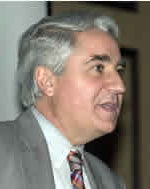One of ECU’s own discusses path to scientific success
One of the country’s premier diabetes and obesity researchers had a philosophical message for students during the keynote speech for the 11th annual East Carolina University Graduate Student Research Day March 3.
Dr. Jose Caro, an endocrinologist and former medical school faculty member, stressed the importance of time, which can seem like an inexhaustible resource to students in their 20s.

Dr. Jose Caro discussed the importance of time to a group of young and not-so-young researchers at ECU March 3. Photo by Cliff Hollis.
“Time is very important,” he said. “We have the gift of time, and we don’t know how long we are going to have it, so we need to use it effectively, starting today.”
Caro’s audience included ECU students seeking doctorates and master”s degrees in the basic sciences to medicine. The daylong event, held at the Greenville Hilton, included formal oral presentations by students as well as poster and abstract presentations.
From the perspective of his long, productive career, Caro can speak with authority about what makes a successful scientist. For the last seven years, he has been vice president of endocrine research at pharmaceutical giant Eli Lilly. He is also a professor at the Indiana University School of Medicine.
Before joining Lilly, he was chairman of the Department of Medicine at Thomas Jefferson University in Philadelphia.
His academic “wonder years,” though, were spent at the ECU School of Medicine in the 1980s in the Department of Internal Medicine. While at ECU, he landed a coveted National Institutes of Health “program project” to study the mechanism of insulin resistance in type 2 diabetes, working with co-investigators Walter Pories and Lynis Dohm, among others. He still looks back fondly on that time.
“The 10 years I spent at ECU were the best 10 years of my life,” said Caro.
Caro’s formal talk was titled “Some of the Dos and Do Nots in Science: From Fuller Albright to the Present.”
He offered a modern take on a paper with a similar title written in 1944 by Fuller Albright (1900-69), a physician-scientist who was one of the leading figures in modern endocrinology and who created the concept of hormone resistance, which is fundamental to understanding diabetes and obesity and its emergence as one of the top health problems.
Indeed, Caro said it is difficult to underestimate the problem of obesity in America today. “Millions and millions of people are obese, and these millions are growing by the minute,” Caro said.
Scientists, including those working with Caro at Lilly, have theorized that “survival genes” that have evolved over millennia were selected for their ability to withstand periodic famine and privation. In an environment of plenitude, however, these same genes are making many people fat, often morbidly so.
“This is an emergency because these (genes) shorten your life by seven to 25 years,” said Caro.
He and his colleagues are focusing much of their efforts on a hormone discovered in 1999 called ghrelin. Produced by the stomach, ghrelin stimulates appetite, with secretions at periodic intervals throughout the day. Interestingly, though, patients who undergo gastric bypasss surgery produce almost no ghrelin. Caro said Pories, a pioneer of the gastric bypass procedure, essentially anticipated this observation more than a decade ago.
Caro would like to better understand ghrelin and ultimately produce a drug that would modulate its effects.
To create such a drug is an expensive, arduous undertaking these days, said Caro, sharing his insider’s view of the pharmaceutical industry. From “hypothesis to marketplace,” the possibility of technical success for any new medication is 3 percent. To bring those fortunate few to market requires 10 years and $1 billion each.